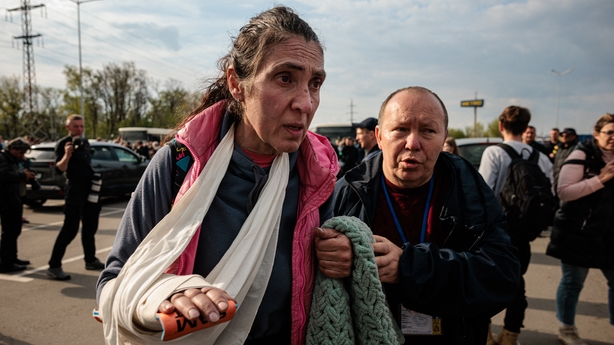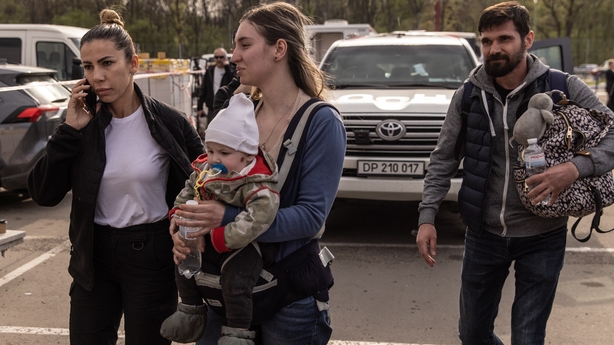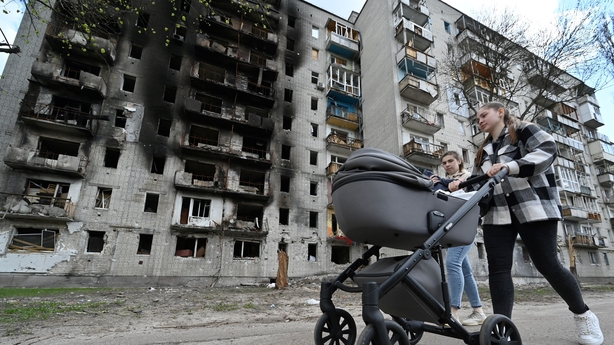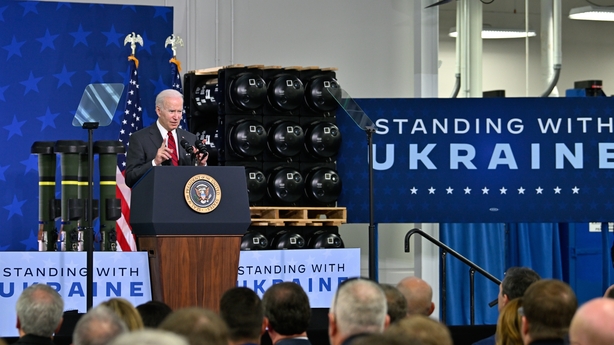Over 300 Ukrainians were evacuated from the battered city of Mariupol today as President Volodymyr Zelensky asked the UN to help to rescue the remaining wounded trapped underneath the giant Azovstal steel plant.
Speaking to the nation in his usual evening address, President Zelensky said 344 people were evacuated from Mariupol and nearby areas and headed northwest for the city of Zaporizhzhia, which is controlled by Kyiv.
But earlier in the day, he also pleaded with UN Secretary General Antonio Guterres to help rescue the wounded who are still sheltering at the plant.
"The lives of the people who remain there are in danger," Zelensky told Guterres by phone.
In a statement, the Red Cross said it was "relieved that more lives have been spared" and called for renewed efforts to continue evacuations from the region "in light of the immense suffering of the civilians."
Meanwhile, fierce battles with Russian troops continued to rage at the Azovstal plant, where Ukrainian soldiers had been holed up for weeks.
Moscow, which has denied any storming of the plant was taking place, said its forces would cease fire at the plant to open a humanitarian corridor for civilians for three days beginning tomorrow.
"The Russian armed forces will from 5am to 3pm on 5, 6 and 7 May open a humanitarian corridor from the territory of the Azovstal metallurgical plant to evacuate civilians," the defence ministry said.
Civilians sheltering at the plant will be allowed to travel to Russia or Kyiv-controlled territory, the statement added.
During this period Russian forces would cease any military activity and withdraw units to a safe distance, it said.
In his conversation with Mr Guterres, Mr Zelensky said that this week's evacuations showed the world "that international organisations can be effective".
He "expressed hope for a successful continuation of the ongoing evacuation operation".
Ukrainian officials said Russian forces entered the territory of the Azovstal plant this evening.
Earlier today, the mayor of Mariupol said heavy fighting was under way at the steel plant, where the city's last defenders and some civilians are holding out.

A spokesperson for the International Committee of the Red Cross (ICRC) said the evacuation was an "extremely difficult and highly complex operation that spanned over five days".
Speaking on RTÉ's Morning Ireland, Chris Hanger said the people ICRC personnel met are "in a deep state of shock".
"Some of them were just crying. Some of them were completely silent. There were some people that asked for a priest. So obviously this was the scene," he said.
Mr Hanger explained that some of the evacuees were children "as young as six months old" who now require medical attention, including mental health support.
He added that it is unclear how many people are still trapped in the steelworks, adding that the ICRC operation is ongoing and dialogue is continuing in order to get as many people out as possible.

A convoy of buses has attempted to evacuate more civilians from Mariupol today.
It was organised by the UN and ICRC and was heading for Zaporizhzhia, Donetsk Governor Pavlo Kyrylenko said.
In a worrying development for Ukraine, the armed forces of Belarus, its northern neighbour and ally of Russia, have begun large-scale drills to test their combat readiness. Some Russian forces entered Ukraine via Belarus when the invasion began on 24 February.
The defence ministry of Belarus said the exercise posed no threat to its neighbours or the European community in general.
Russia is targeting Mariupol as it seeks to cut Ukraine off from the Black Sea and connect Russian-controlled territory in the south and east.
Read more:
Latest Ukraine stories
Russian forces have continued to pound targets in eastern Ukraine.
Parts of the eastern regions of Donetsk and Luhansk were held by Russian-backed separatists before President Vladimir Putin launched the 24 February invasion.
Hit by Western sanctions, Russia now faces new measures from the EU that would target its banks and oil industry - a major step for European countries that rely heavily on Russian energy.
Moscow showed no signs of backing down nearly ten weeks into what it calls a "special military operation", a war that has killed thousands, destroyed cities and driven more than five million Ukrainians to flee abroad.
Russia's own $1.8 trillion economy is heading for its biggest contraction since the years following the 1991 break-up of the Soviet Union.
Russian forces turned their heaviest firepower on Ukraine's east and south after failing to take Kyiv, the capital, in the opening weeks of the war.
There were also fresh attacks in the west. The mayor of Lviv said Russian missile strikes had damaged electricity and water networks in the western city near the Polish border, across which flows Western arms supplies for Ukraine's military.
Russian forces also struck six railway stations in the centre and west of the country, the head of Ukraine's railways, Olesksandr Kamyshin, said. There were no injuries to civilians, he added on Twitter.

building in the northern city of Chernihiv
In the east, Russian attacks in Donetsk yesterday killed 21 civilians and injured 27, regional Governor Pavlo Kyrylenko said. He said the figure was the highest daily death toll in the region since last month.
Attacks and shelling also intensified in Luhansk, with the most difficult area being Popasna, where it was impossible to organise evacuations, regional Governor Serhiy Haida said.
"There are no safe cities in Luhansk region," he said on Telegram.
Ukrainian President Volodymyr Zelensky said Russia's military "reacted ... with great anger to our successes".
Russia said it had struck a military airfield near the Black Sea port of Odesa with missiles, destroying drones, weapons and ammunition supplied by the West. Ukraine said three missiles targeted the Odesa region and all were intercepted.
Mariupol, a city of 400,000 before the invasion, has seen the bloodiest fighting, enduring weeks of siege and shelling.
A ceasefire broke down with some civilians still trapped in the bunkers beneath the steel works despite a UN-brokered evacuation.
Mr Zelensky accused Russia of breaching agreements to pause fighting to allow civilians to escape.
"They're still fighting. They're still bombarding and shooting," Mr Zelensky said via video link at a Wall Street Journal event. "We need a breather."

US President Joe Biden used a visit to a Lockheed Martin defence plant to press the US Congress to approve his proposed $33 billion assistance package for Ukraine, which includes more than $20 billion in military aid.
"If you don't stand up to dictators, history has shown us, they keep coming, they keep coming," Mr Biden told workers at the plant in Alabama.
